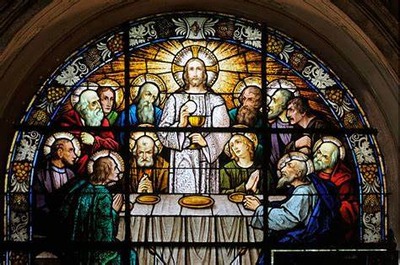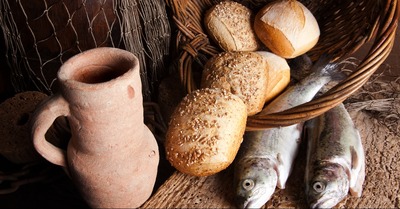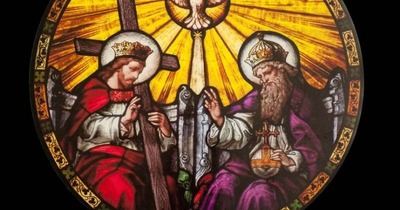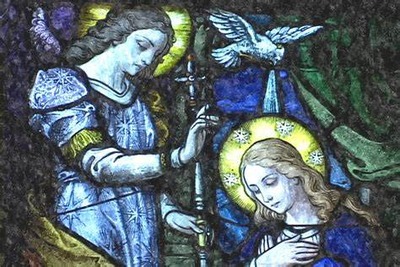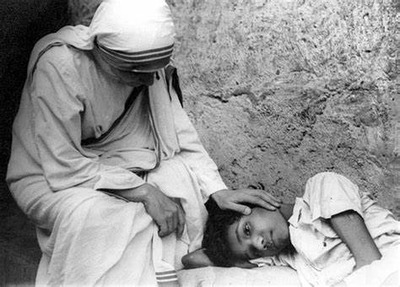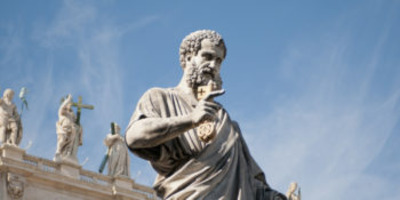May 26, 2024
|by N W
|
0 Comments
|
Deacon Mark, Eucharist, Family, Holy Spirit, Mary, St. Joseph, Trinity
The Solemnity of the Most Holy Trinity
May 26, 2024 — Year B
Readings: Dt 4:32-34, 39-40 / Ps 33 / Rom 8:14-17 / Mt 28:16-20
by Rev. Mr. Mark De La Hunt, Permanent Deacon
Before there was YouTube, Scott Hahn, and the Catechism, I was asked to teach 9th grade faith formation. It was a small college parish that had few resources and, accordingly, I wasn’t given a book to teach from. I knew very little about my faith like most 20-something Catholics in the early 1990s. One evening, one of the 9th grade boys told the class that the Trinity is nowhere in the Bible. In my ignorance, I was incapable of saying, “Yes, it is,” and then showing him, much less leading him to the joy of living in the Trinity. I pray in the name of the Father, and of the Son, and of the Holy Spirit that I can do that for you now.
I am going to show you where the Trinity is in the Bible, and how the scriptures present the Father, Son, and Holy Spirit as one God in three Persons, equal in power and knowledge, all existing for all time, uncreated with no beginning and no end. Once we have that firm footing, I will give some pastoral guidance on living in communion with the Trinity, especially for teenagers.
If I was teaching that 9th grade class today, I would show that teenage boy where the Trinity is in the Bible. Jesus’ use of the Trinity at the end of Matthew’s gospel, “Go, therefore, and make disciples of all nations, baptizing them in the name of the Father, and of the Son, and of the Holy Spirit…” was not brought up out of the blue by Matthew (Mt 28:19). He reveals the Trinity at the baptism of Jesus in chapter 3:16-17, saying when Jesus (the second Person of the Trinity) came up out of the water, the Spirit of God (third Person of Trinity) descended upon Him in the shape of a dove, and then the voice of the Father (first Person) says He is well pleased in His Son (Mitch, pg. 371). Sooo, when someone says the Trinity is not in the Bible, you can show them Matthew 3 and 28.
I’m guessing, though, that teenage boy, in the annoying way teens can excel at, would say, “Hey Mr. De La Hunt, look at the first reading where Moses tells the people, ‘The Lord is God…and…there is no other (Dt 4:35).’ It doesn’t mention Father, Son, and Holy Spirit.” Worshiping only one God, which is called monotheism, set Israel apart from all other nations in its day, and they fiercely defended this belief. To this day, the Jews’ belief that Father, Son, and Holy Spirit cannot be one God, is said by some to be the biggest stumbling block for their embracing Jesus Christ as the Messiah. The confusion and unbelief are understandable. The Trinity is not easy to wrap your head around. It took the Church over three hundred years to articulate the doctrine (Mitch, pg. 371).
Fortunately, one of the greatest biblical preachers on the Trinity was a fiercely devout and highly learned Jew, St. Paul. When he was still going by the name of Saul, he was persecuting Christians, because they were calling Jesus God. But when Jesus removed those scales from Paul’s eyes in Damascus, Paul saw Father, Son, and Holy Spirit as that one God of whom Moses spoke (Acts 9:18).
In today’s second reading from Paul’s letter to the Roman church, he tells the Christian community that they have received a “Spirit of adoption, through whom we cry, ‘Abba, Father!’ The Spirit himself bears witness with our spirit that we are children of God, and if children, then heirs, heirs of God and joint heirs with Christ. (Rom 8:15-17).” This wasn’t the only place Paul invoked the Trinity while spreading the Good News.
In chapter 13 of his second letter to the Corinthians, Paul greets the people with words that Father greeted you with at the beginning of the Mass. “The grace of the Lord Jesus Christ, the love of God, and the communion of the Holy Spirit be with all of you (2 Cor 13:13).” Sounds pretty Trinitarian. I could also show that 9th grader 1 Corinthians 12, Galatians 4, and 1 Thessalonians 1. Oh, if only I had Curtis Mitch’s and Ed Sri’s Catholic bible commentary when I was in my twenties. Hopefully that young man kept pursuing the truth.
All I have proven, though, is that a devout, fiercely monotheistic Jew came to see a Father, a Son, and a Holy Spirit. But you are excellent at debating and call me on it. You rightly say, “Deacon Mark, you must prove all three are God.” Ok. Let’s start with the easiest one. God is God, creator of heaven and earth and all that is visible and invisible. The Old Testament, like today’s first reading with Moses and today’s Psalm speak to this.
You smile, confident you will disprove the second Person of the Trinity, asking, “What about Jesus? To be God, you must have existed for all time, be uncreated, no beginning, no end. But Jesus was born of a woman.” John’s gospel best speaks to Jesus being God. “In the beginning was the Word, and the Word was with God, and the Word was God…He was in the world, and the world came into being through Him…And the Word became flesh and lived among us. It is God the only Son (Jn 1:1, 10, 14, 18).”
At this point, I want to defend Our Lady, that “woman” who gave birth to Jesus. I would be remiss to not mention that Mary was declared the “Mother of God” at the Council of Ephesus in 431 AD. But it wasn’t only that gathering of bishops who believed that. A crowd of the faithful waited in the streets for them to affirm what they already believed. And they celebrated joyfully when Mary, mother of Jesus, was affirmed as Mary, mother of God the Son.
Your confident smile falters, but you recover and move on to the third Person of the Trinity. You, with noticeably less bravado, say, “Jesus says the Father will send the Holy Spirit, and He even breathes the Spirit onto the apostles (Jn 14:26; 15:26; 20:22). For all three to be God, they must all three be equal in power and knowledge, which is to say in omnipotence (all powerful) and omniscience (all knowing). Doesn’t sound like the Holy Spirt is equal, because He is always being sent.”
The Deacon smiles at you, so happy that you are seeking truth. He encourages you to open your Bible to 2 Corinthians, where Paul writes, “No one comprehends the thoughts of God except the Spirit of God (2 Cor 2:11).” God’s thoughts are infinite, so for the Spirit to comprehend God’s thoughts, the Spirit must also have infinite knowledge or omniscience. Next, the Deacon shows you 1 Corinthians, where Paul calls our body a “temple of the Holy Spirit (1 Cor 6:19).” The Deacon says, “Only God can have a temple, so the Holy Spirit must be God (Tim Staples).” Finally, the Deacon turns to Acts 5 and reads, “But Peter said, “Ananias, why has Satan filled your heart to lie to the Holy Spirit and to keep back part of the proceeds of the land? . . . You have not lied to men but to God.” Like St. Paul, St. Peter, also a Jew, saw God and the Holy Spirit as the one true God of Israel. (A shoutout to Catholic Answers for this paragraph.)
Now we know some of the scriptural basis for the Most Holy Trinity, but how do we live this deep theological mystery? First, and foremost, we never, ever miss Mass. If we are healthy enough to go to the grocery store or out to eat, we are healthy enough to go to Mass. Dads and Moms, do not let any of your children miss Mass due to camping or beach trips, band, or dance, or soccer, or volleyball, or AP class projects. Why?
First, we have a desperate need to receive our Lord’s body and blood. But also, we should do so because it is the most powerful way in which we live within the communion of the Trinity. We worship God the Father, offering the one sacrifice of Christ the Son, through the power of the Holy Spirit. The Trinity makes our Catholic worship perfect. And remember that God is a communion of Persons in the Most Holy Trinity, so to worship in the Trinity, we need to do so in communion with others, the Trinity making us into a holy, mystical communion.
Let’s put some blue jeans on this. When we are baptized in the name of the Father, and of the Son, and of the Holy Spirit, God makes us part of His family. Teenagers, since we started this homily with a teenager, I am coming back to you. Know that our family is where we discover who we are. There is a memory helper or pneumonic for this, RIM which stands for Relationship, Identity, Mission. This applies to your natural family, but also to your supernatural family, the Trinity.
Teens and twenty somethings too, I know you are in a very challenging time in life between becoming an adult and knowing the path God wants your life to take. This time brings to your mind heartfelt questions. Who am I? Where is my place in this world? What strengths, talents, and capabilities do I have? Should I go to college? If so, what should I study? Should I get a job instead, so I can receive training from my employer? If so, what type of job should I pursue? Am I to get married? If so, how will I find the right person? If not marriage, should I check out consecrated religious life? Holy Orders?
You will find the answers within your supernatural family of the Trinity. Back to RIM. Relationship: pursue your relationship with the Trinity in prayer (daily), the Mass (at least weekly), and Confession (often). Identity: Being close to the Trinity will help you to learn who you are and what gifts you have. Mission: Now that you know who you are, you can go on mission with the grace of Jesus Christ, the love of the Father, and your communion with them through the Holy Spirit. They will work with you and show you the way.
It is not as easy as it sounds, though. You will need patience and trust. God tends to show us one step at a time. Our job is to stay in Relationship with Him (prayer, Mass, Confession) so we can see that next step and trust Him by taking that step. Joseph is a helpful model here. He was given one step at a time, and he took them.
Remember how God came to Joseph and told him to take Mary as his wife, and oh by the way she is already pregnant, and the child is God. Wow. What does Joseph say, “Yes Lord.” Then, in the middle of the night, God wakes up Joseph and tells him to take Mary and Jesus to Egypt. No one wants to be woken up in the middle of the night, much less to drop your life and move to a new one in a strange place. Joseph, said, “Yes Lord.” And when God told him, a short while later, to move back to Israel, Joseph took that step too.
One could say this about Joseph. “By being united to Jesus and animated by the Spirit of love and obedience, [Joseph knew the] joy that is perfect and complete, a joy that comes only from participating in the divine communion (Jeff Cavins, Hallow).” Jeff Cavins spoke of this joy using the words of the prophet Nehemiah, “The joy of the Lord (Trinity) is your strength (Neh 8:10).” He went on to say, [our joy] is not just a fleeting emotion but a deep and abiding reality that comes from communion with the Trinity.
Final words. Whether we are born into an amazing family or a broken one, or in a place that is fantastic or one that is dark, or have built a successful life or made a hot mess of it, none of those things define us! What defines us is our baptism, for from that day onward, we call the most-high God Father, and Jesus who is the King of the Universe, brother, and the Holy Spirit, the love that flows between them, counselor, helper, and guide. The Psalm today, unbeknownst to the author, was written about us, the baptized. “Blessed the people the Lord (Trinity) has chosen to be His own. Our soul waits for the Lord, who is our help and our shield. May your kindness, O Lord, be upon us who have put our hope in you.” Lord, grant us the grace we need to order our lives to be in communion with You who are Father, Son, and Holy Spirit. Amen.
Citations
Jeff Cavins Daily Reflections on Hallow, May 11, 2024. He references the Catholic Commentary of Sacred Scripture which I used to describe Joseph’s living in the Trinity.
Tim Staples – Catholic Answers. Simply Google Catholic Answers on the Trinity. You will see “Explaining the Trinity” by Tim Staples dated June 20, 2014, at catholic.com.
Curtis Mitch and Edward Sri. “Catholic Commentary on Sacred Scripture, The Gospel of Matthew.” Baker Academic 2010.
KEEP READING
 540-586-8988
540-586-8988 

